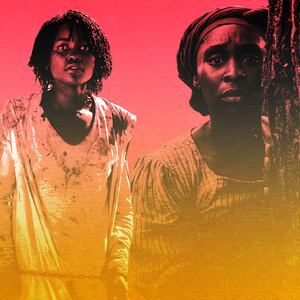“Do you ever think about how everything we do is an echo of something? Like how everything we’ve done is going to happen again, and everything we’re going to do has already happened somewhere else?” muses stoned English police officer Sarah (Kelly Macdonald) midway through Giri/Haji, and though self-referentiality is surely unintended, it’s a comment that routinely seems to pertain to this eight-part Netflix series itself. A professionally mounted and consistently engaging regurgitation of stock crime-fiction archetypes and entanglements, it’s a bilingual work (available now) less interested in reinvention than in solid, straightforward dramatic thrills. On that count, the series achieves its modest goals—and, thanks to a few unexpected flourishes, occasionally exceeds them.
Originally broadcast on BBC Two in late 2019, Giri/Haji’s title is translated as “Duty/Shame,” and there’s plenty of both to be found in writer/creator Joe Barton’s cross-cultural effort. In London, a yakuza in the employ of boss Shin Endo (Katsuya Kobayashi) is murdered with a ceremonial sword that belongs to rival godfather Fukuhara (Masahiro Motoki). Retaliation in Tokyo follows, thus shattering the fragile peace between the underworld gangs. Tasked by Chief Inspector Hayashi (Kazuyuki Tsumura) with setting things straight is Kenzo Miro (Takehiro Hira), a no-nonsense Tokyo detective with a tumultuous family life—distant wife Rei (Yuko Nakamura), unruly daughter Taki (Aoi Okuyama), and live-in parents—and a brother, Yuto (Yosuke Kubozuka), who died a year earlier after being in the employ of Fukuhara. Or, at least, Kenzo believed him to be dead, since he’s soon informed that when Yuto fled Fukuhara (under mysterious circumstances), he was in possession of the aforementioned sword—meaning he’s alive, in London, and initiating catastrophic turf warfare as a means of exacting revenge against his former boss.
Given that both Hayashi and Fukuhara want to avoid that conflict, they send Kenzo to London (undercover, via an educational exchange program) to track down his ne’er-do-well brother. Kenzo is furious that his sibling is still running around causing trouble, and flashbacks—here denoted by a narrower aspect ratio that suggests the way the past puts a veritable squeeze on the present—reveal that Kenzo covered up a prior Yuto crime in murderous fashion, thus instigating his brother’s descent into yakuza service.
Once abroad, Kenzo bonds with his teacher Sarah (Macdonald), who’s dealing with the news that her ex, Ian (Jamie Draven), has recently been paroled, this after she put him away for police misconduct—although her motivations, one later understands, were more selfish than noble. As if that weren’t complicated enough, Taki, having been expelled from school, arrives in London to spend time with her father, who’s enlisted a gay male prostitute named Rodney (Will Sharpe) to be his guide—all as Rodney struggles with guilt over having driven, through sheer callousness, his most recent boyfriend to commit suicide.
As that synopsis indicates, Giri/Haji is overflowing with issues of honor and responsibility, not to mention regret, love, family, disgrace, treachery, and rivalry. Aside from the occasional split-screen, directors Julian Farino and Ben Chessell frame their action in clean compositions that make suitable use of menacing shadows, and keep the material lucid even when the various characters’ allegiances become hopelessly knotted up. It doesn’t take long for that to happen, since no sooner has Kenzo begun sleuthing than he’s learned that Yuto has been working for Abbot (Charlie Creed-Miles), a local gangster covered in Eastern Promises-style tattoos who teamed with the Japanese assassin at the expense of his prior professional relationship with Vickers (Justin Long), the son of a Pittsburgh mafioso. Everything’s intertwined, and the fact that the series never becomes overly messy—and manages to keep a rigid focus on its well-drawn characters, which soon include secret lovers, tormented killers and a sought-after infant—is a testament to its craftsmanship.
Kenzo and Sarah’s developing romance is no great shock, but there are surprises in store for those who make it past Giri/Haji’s first few episodes. Barton spends considerable time laying the groundwork for what turns out to be a multifaceted look at the complications that arise when tortured emotions butt up against personal and professional obligations. As all of his primary players eventually discover, duty to one’s job, colleagues, friends, family and self can be easy to recognize and yet difficult to live up to, especially when love, fear and fury are thrown into the mix. Such concerns are handled with a minimum of preachiness, and flow naturally from the twists and turns of the intricate plot, which is comprised of the usual gunfights, betrayals and covert dealings inherent to the yakuza genre.
Giri/Haji is so competent at what it’s doing that one sometimes wishes it would do more than simply rehash elements that have been seen a thousand times before. While it largely refuses to paint outside the prescribed lines, though, it derives modest electricity from its East-West dynamic, as well as from its leads. Be it Hira as the grim, flawed, good-hearted Kenzo, Macdonald as the fallible but decent Sarah, or Kubozuka as the wayward and conflicted Yuto, the cast elicits empathy throughout, helping prop up the proceedings’ uniform violence-and-duplicity shenanigans. And in Sharpe’s scene-stealing performance as tormented coke-addict wild-child Rodney, a young man so lost that each new step leads only to further peril and misery, the series unearths a budding star in the process.
No matter that it’s an Asian-English hybrid, Giri/Haji isn’t flashy or unique enough to become a water-cooler phenomenon. Nonetheless, there’s pleasure to be had from its recycling of well-worn components into something heartfelt and three-dimensional. Only at its very end does it take a truly major artistic risk, pausing a climactic confrontation between multiple forces to stage a lyrical, expressionistic black-and-white dance routine in which each major character conveys their literal and emotional plight vis-à-vis silent body movement. It’s a moment so startlingly original and affecting, one wishes Giri/Haji hadn’t been afraid to think outside the box more during its preceding eight hours. Then again, the fact that its sturdy drama begat such an unforgettable sequence is justification alone for the entire affair.







